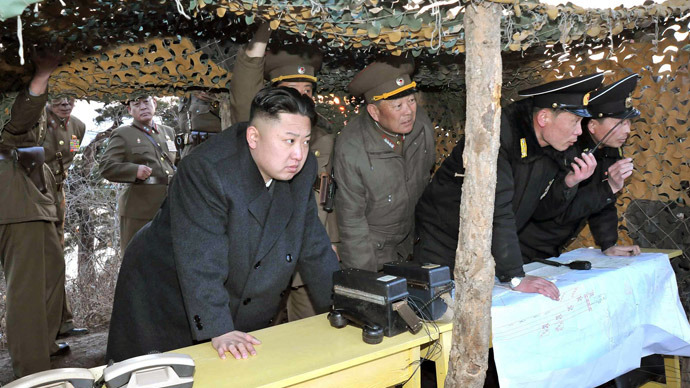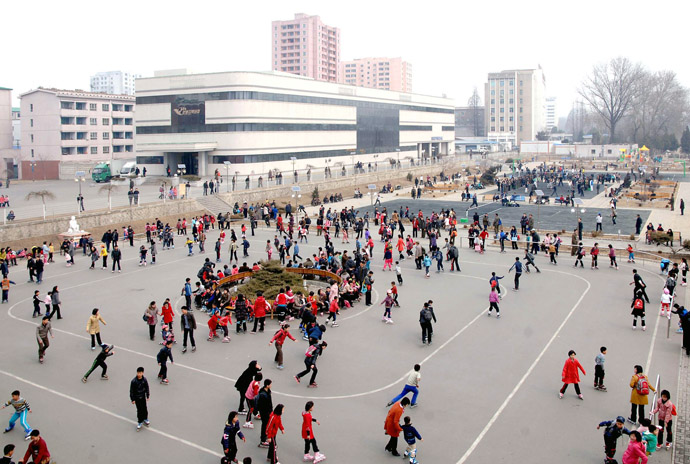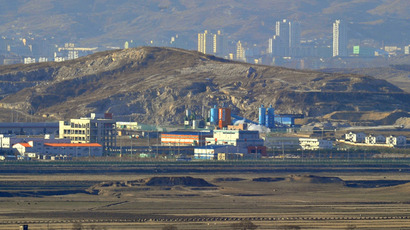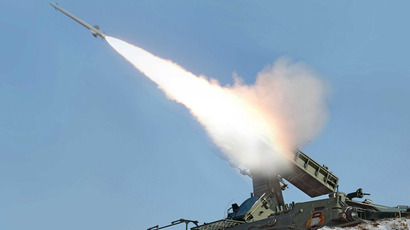N. Korea tensions: Seoul calm while UK, US officials voice concern

Seoul says North Korea has loaded a second intermediate-range missile on mobile launchers hidden in an unidentified facility near the east coast. Nonetheless the South seems calm about the Pyongyang maneuvers, while some Western powers grow anxious.
Earlier this week it was reported that the northern Communist
state moved medium-range missiles to its east coast. In response,
the US announced it was strengthening missile defense system to its
base on the Pacific Ocean island of Guam.
South Korean Defense Minister Kim Kwan-jin dismissed Japanese
media reports that North Korea’s arsenal was a long-range missile
capable of striking the mainland United States. He also proposed
that the maneuvers made by the North could be “for testing or
drills".
The possibility of a full-scale provocation from Pyongyang is
small and the threats are rhetorical, Kwan-jin said.
Meanwhile, the UK apparently sees more than just rhetoric in the
North Korean warnings.
Prime Minister David Cameron said it would be "foolish" for
Britain to renounce its nuclear upgrade program in the face of
threats from North Korea.
The prime minister stated that the UK needs an “ultimate
weapon” to be able to defend itself from the growing threat of
nuclear attack.
The statement was ridiculed by many as the UK and North Korea
are separated by nearly 9,000km, while the missile's potential
range is less than 7,000km.

Even Cameron's own supporters doubt the credibility of his recent assertions, RT`s contributor Afshin Rattansi said.
“More than one in four of the children in this country are living in poverty, and yet this US$150 billion is required to fend off threats from Iran and North Korea!” Rattansi said.
Labor Party MP Jeremy Corbin stressed to RT how flawed the logic
is to purchase a new missile system when the country is crippled by
measures to pull it out of an economic crisis – especially when
there is no concrete proof that having a weapon is directly related
to security.
“A hundred billion pounds spent on a new nuclear missile system
at a time when austerity is the order of the day in Britain – with
cuts in the public system, redundancies and rising unemployment –
is not a sensible use of money. To claim that it makes Britain more
secure is simply not credible. On that argument, every country in
the world would have nuclear weapons.”
One may naturally ask if Britain could become a target of hostile
regimes who potentially dabble in nuclear weapons themselves.
Corbyn’s thoughts on this clearly go in the opposite direction,
stressing that one must look at the reasons for why they are a
target, instead of rushing to demonize another and raise the stakes
with own threats.
“Why are we targeted? Is it because we have nuclear weapons or
is it for some other reason? Many other countries in the world
manage perfectly well without nuclear weapons and are not
themselves under threat or under target. What we need – rapidly and
urgently – is an international engagement with Iran; likewise with
North Korea. And I hope that a country will take the initiative of
actually talking to North Korea, rather than the way the rhetoric
is being ratcheted up all around.”
On Friday, North Korea’s Foreign Ministry suggested Moscow consider
evacuating its staff from the embassy in Pyongyang and other
Russian organizations in the country, citing “the tense
situation on the Korean Peninsula.”
However, so far the embassy is working to its regular schedule and
the capital appears calm and routine, a press secretary for the
diplomatic mission in Pyongyang, Denis Samsonov, told RT. Russian
diplomats are monitoring the situation closely, he added.
Russia’s Foreign Ministry also urged not to exacerbate the
tensions.
“We find it absolutely unacceptable to build up war
hysteria,” the official statement read.
Tensions in the region have been spiking since February when
North Korea carried out its third nuclear test. The launch was
condemned by the UN and numerous world powers, prompting the UN to
approve a new round of sanctions in early March.
Pyongyang reacted to sanctions by threats to launch a nuclear
strike on the US. The North was also highly dissatisfied with the
annual joint military drills between South Korea and the
US.
Last week, Pyongyang threatened to breach the armistice of 60 years and declared a “state of war” with South Korea, saying it would treat the southern neighbor according to “wartime regulations.”














